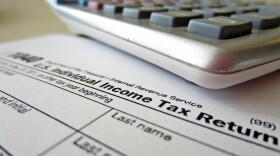With only a few days remaining in this tax year, New Hampshire taxpayers are searching for ways to maximize their refunds or minimize their tax bills under new 2018 tax rules.
Chris Sullivan is a tax attorney with Rath, Young and Pignatelli. He joined NHPR's All Considered to answer some pressing tax questions.
Note: This transcript has been edited lightly for clarity.
So let's start with property taxes. New Hampshire has relatively high property taxes. Does it make sense to prepay these?
As we've heard, some people are doing it and it very well may make sense to do so. The IRS issued guidance yesterday that indicated that you could prepay property tax if it has been already assessed and then is paid prior to the end of the year. So for taxpayers that have already received their assessments for the year,, even though the payments are due in 2018 they could pay them by the end of this year and get the deduction in this year's tax return.
Have you heard anything about how this could affect towns?
Well there is a state law provision that towns would have to adopt that would allow them to have prepayments and accept prepayments. That law was put in place well before this tax reform act. But that law also specifically indicates that those amounts are held in escrow and in a separate place so the towns couldn't spend the money. And then that state law also really is a way of forwarding a payment for taxes that are not yet assessed.
So if a taxpayer attempted to do so, it wouldn't qualify under the federal reform.
Pass-through companies like LLCs or sole proprietorships, they may get a big tax break under this new plan. Would setting up an LLC or a sole proprietorship makes sense for the average person or a small business owner?
You know there's a big principle in tax law that substance governs over form. And I suspect when there's additional guidance on those pass-through or provisions which are going to be very important, that late December moves will not be as easily accomplished as additional charitable deductions or funding an IRA or prepaying state and local taxes.
What about charitable contributions? Is there any reason why folks should rush to make donations before January 1st?
Well, one of the things that the tax reform law does is to double the standard deduction so over time, fewer and fewer people will be itemizing. One of the things that people tend to have itemized deductions on is charitable deductions - charities will always be pushing for end of the year donations. And if that is your passion to support those charities, you will get an additional tax benefit by making those contributions this year. Donor-advised funds are also very popular and are a method of being able to accelerate some of the deductions that you would intend to have in future years.
Is there anything that you are doing to prepare for your personal taxes for that for the coming year?
I think one of the benefits of being a tax attorney is you think about these things during the year. So I tend not to make a lot of end-of-the-year adjustments, but it's always a good time to look at your charitable donations and things that you are going to do anyway. If you can accelerate them into a current tax year that's a good thing, and if you can defer income into a subsequent year that is usually a good thing.
Do you think that there's something in this new tax law that will be particularly good for New Hampshire residents?
Well the the current controversy over the state and local taxes deduction does not tend to affect New Hampshire as much as other jurisdictions because we don't have an income tax and we don't have a sales tax. So the items that are getting the most attention in the press right now really don't affect New Hampshire as compared to other states.









